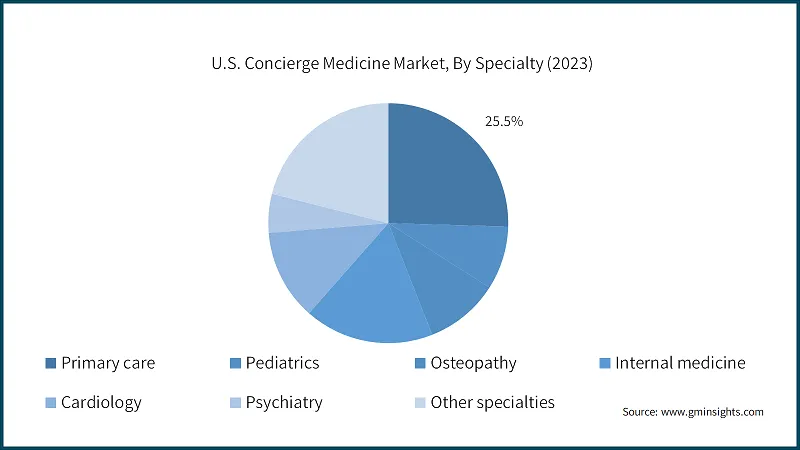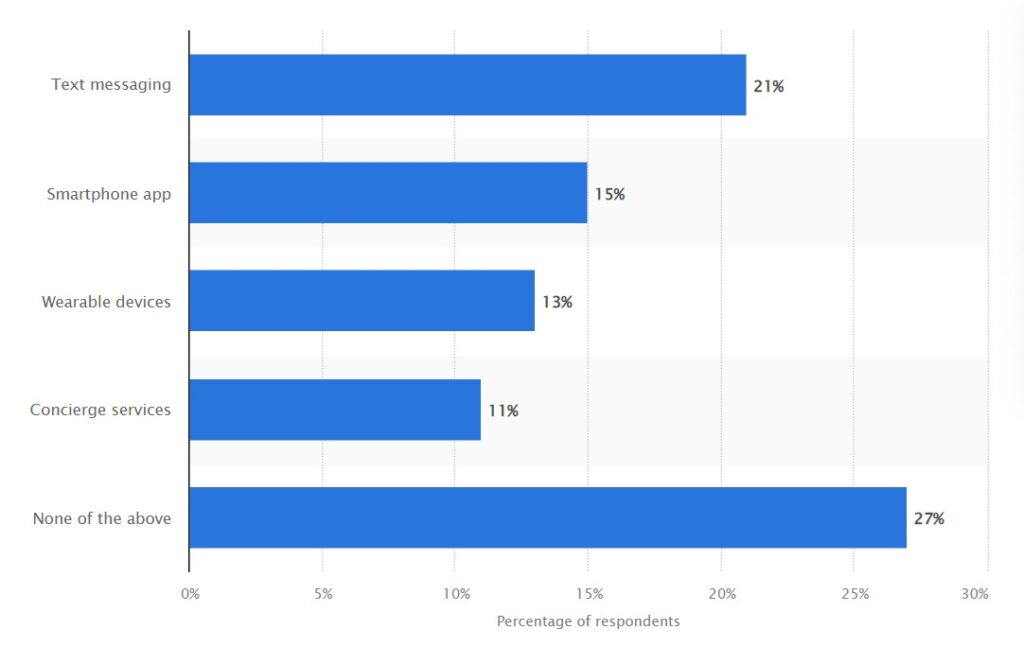Concierge medical practices are transforming the healthcare landscape by offering a more personalized and attentive approach to patient care. As traditional healthcare systems often fall short of patient expectations, concierge medicine has become a staple for those seeking tailored healthcare solutions and medical specialties that go beyond primary care.
However, a common misconception persists that concierge medical practices lack specialty medicine. These practices provide a wide array of medical specialties, far beyond just primary care.
In this post, we’ll delve into the diverse medical specialties offered by concierge practices, debunk some common myths, and explore the unique advantages they provide.
How Does a Concierge Medical Practice Work?
A concierge medical practice redefines healthcare by offering a patient-centered approach. Physicians in these practices maintain smaller patient panels, allowing for more time with each patient and fostering strong doctor-patient relationships. To get this personalized care, patients pay an upfront membership fee.
Think of it this way:
- Concierge medicine vs traditional healthcare: The latter often involves a larger patient base, long waits, and brief appointments.
- Concierge medicine vs direct primary care: Unlike concierge medicine, the direct model does not provide 24/7 access to physicians, same-day appointments, and comprehensive wellness checks.

Concierge Medical Specialties and Services
Concierge medicine offers various specialties and services, tailored to provide comprehensive, personalized, and highly accessible healthcare. Here are the diverse specialties and services typically found in concierge medical practices:
Concierge Medical Services
- Concierge primary medicine: This service offers personalized and continuous care. Patients receive comprehensive wellness checks and preventive care tailored to their unique health needs. With 24/7 access to their doctor, patients benefit from same-day appointments and a proactive approach to maintaining optimal health.
- Concierge emergency medicine: Ensuring immediate attention and rapid response to urgent health issues, this service often includes coordination with local hospitals and specialists. Patients can reach their physician directly, bypassing typical wait times associated with emergency rooms.
- Travel medicine: These services provide tailored healthcare solutions for patients on the go. This includes pre-travel consultations, vaccinations, and health advice specific to travel destinations. Additionally, patients have access to medical support and emergency evacuation services while abroad, ensuring their health is managed wherever they are.
- Family medicine: Concierge family medicine addresses the healthcare needs of all family members, from children to the elderly. Physicians offer in-home visits, chronic disease management, and personalized care plans. This service ensures continuity of care, making it convenient for families to receive comprehensive medical attention.
- Preventive medicine: This focuses on early detection and prevention of diseases through regular health screenings and lifestyle counseling. Patients receive personalized advice on diet, exercise, and other lifestyle modifications. Vaccinations and health risk assessments are also key components, aiming to prevent illnesses before they develop.
Concierge Medicine Specialties
- Internal medicine: Concierge internal medicine physicians manage a broad range of adult health issues, providing comprehensive care for complex and chronic conditions. They focus on prevention, diagnosis, and treatment of diseases affecting adults.
- Cardiology: Concierge cardiology services involve detailed cardiovascular care. Patients benefit from personalized monitoring and advanced diagnostic tools.
- Pediatrics: Pediatric concierge medicine offers specialized care for children, from newborns to adolescents. Pediatricians provide preventive care, vaccinations, and treatment for childhood illnesses in a family-friendly environment.
- Geriatrics: Geriatric concierge medicine focuses on the unique health needs of older adults, addressing chronic diseases, mobility issues, and cognitive health. Personalized care plans aim to improve the quality of life for seniors.
- Endocrinology: Concierge endocrinology services manage hormonal imbalances and endocrine disorders such as diabetes, thyroid conditions, and metabolic disorders. Patients usually receive tailored treatment plans and continuous monitoring.
- Rheumatology: Rheumatologists in concierge practices diagnose and treat autoimmune and inflammatory diseases, including arthritis and lupus. They offer personalized care plans to manage chronic pain and improve function.
- Dermatology: Dermatology services cover skin health, including the treatment of acne, eczema, and skin cancer screenings. Concierge dermatologists provide cosmetic procedures and personalized skin care advice.
- Gastroenterology: Gastroenterologists treat digestive system disorders, including IBS, Crohn’s disease, and liver conditions. They offer comprehensive diagnostic tests and individualized treatment plans.
- Orthopedics: Orthopedic care includes the treatment of musculoskeletal issues such as fractures, joint problems, and sports injuries. Personalized rehabilitation and surgical interventions are provided as needed.
- Neurology: Neurologists address disorders of the nervous system, including epilepsy, migraines, and neurodegenerative diseases. Patients benefit from advanced diagnostics and personalized treatment strategies.
- Psychiatry and mental health: Psychiatry services provide mental health care, including therapy and medication management for conditions such as depression, anxiety, and bipolar disorder.
- Oncology: Oncology services focus on cancer prevention, diagnosis, and treatment. Concierge oncologists offer advanced treatments and continuous support throughout the whole treatment.

Common Misconceptions Around Concierge Medical Practices
Despite the growing popularity of concierge medicine, several misconceptions persist about what these practices truly offer.
Here are some of the most common misconceptions and the truths behind them:
Myth 1: Concierge Medicine Practices Lack Specialty
Fact: Contrary to popular belief, concierge medicine isn’t limited to primary care.
These practices offer a wide range of medical specialties, including cardiology, dermatology, endocrinology, and more. For instance, there are concierge medicine specialties like travel medicine, family medicine, and preventive care, ensuring comprehensive healthcare for all patient needs.
WorldClinic elevates this approach by offering diverse services under their memberships, from executive health programs to longevity and health coaching, demonstrating the extensive benefits beyond traditional primary care.
Myth 2: Doctors Can Easily Go Concierge
Fact: Transitioning to a concierge model is far from easy. It involves significant changes in practice management, patient communication, and financial planning. Many physicians struggle with the shift due to the administrative and operational challenges.
WorldClinic supports this transition by partnering with physicians and health systems, offering expertise and infrastructure to make the switch smoother and more meaningful for both concierge doctors and patients.
Myth 3: Concierge Doctors Are in It for the Money
Fact: The motivation behind concierge medicine extends well beyond financial gain. Many doctors choose this model to provide better, more personalized care and to improve their work-life balance.
For instance, Dr. Parks from WorldClinic says that the concierge model allows him to focus on patient care without the constraints of insurance or corporate healthcare.
The comprehensive annual fee model often leads to better financial outcomes for patients by reducing long-term healthcare costs through preventive care and continuous health management.
Myth 4: Concierge Medicine Practices Aren’t Suited for Emergency Care
Fact: Concierge medicine excels in providing timely and effective emergency care. Patients have 24/7 access to their physicians, which is crucial during emergencies.
WorldClinic’s telemedicine solutions, for example, ensure that patients can reach board-certified physicians anytime, anywhere. As one of WorldClinic’s members shares, this model can literally save lives by providing immediate care when you need it most.

How to Pick the Right Concierge Medical Practice for Your Needs?
Choosing the right concierge medical practice is crucial for personalized, high-quality healthcare. Here’s what you should look out for:
- Customized health plans: Look for practices that offer tailored health plans to meet your specific medical needs. Customized plans ensure that your unique health concerns are addressed with precision and care.
- Doctor credentials and experience: Check the credentials, certifications, and affiliations of the doctors. Board-certified physicians with extensive experience in their specialties will provide you with the best care.
- 24/7 accessibility: Ensure the practice provides round-the-clock access to your physician, especially through telemedicine. This is vital for immediate care, whether at home or while traveling.
- Facilitated referrals and care coordination: A top-notch concierge practice will handle all aspects of your healthcare, including facilitated referrals to specialists and comprehensive care coordination. This ensures seamless communication between different healthcare providers, saving you time and stress.
- On-site advanced medical capabilities: Evaluate the on-site medical facilities. Practices with advanced imaging technology, full laboratories, and the ability to perform comprehensive diagnostic tests on premises streamline the pathway to diagnosis and treatment.
- Access to house calls: Consider whether the practice offers house calls for times when visiting the office is impractical. This service, though often at an extra fee, can be invaluable during illness or injury.
Conclusion
Concierge medical practices offer a revolutionary approach to healthcare by providing personalized, accessible, and comprehensive specialty care that goes beyond traditional primary care. These practices cater to a wide range of medical specialties and ensure high-quality service through experienced, board-certified physicians.
WorldClinic stands out as a premium concierge healthcare services provider with a board-certified team of concierge doctors specializing in numerous medical fields, backed by extensive education and credentials.
The customizable membership models at WorldClinic ensure unparalleled care without limitations. Explore our comprehensive concierge medical services and discover how WorldClinic can redefine your healthcare experience.
Frequently Asked Questions
Yes, concierge medicine services seamlessly integrate with primary care. This model enhances traditional primary care by offering extended access, personalized attention, and comprehensive management of your health.
Concierge physicians often collaborate closely with primary care providers, ensuring continuity of care and comprehensive health management.
Concierge medical practices are sometimes thought to lack specialty because the model initially focused on providing enhanced primary care services.
However, this misconception overlooks the fact that many concierge practices include a range of specialties, from cardiology to endocrinology, ensuring comprehensive care that goes beyond general medicine.
Concierge medicine doctors are evaluated for specialty through rigorous credentialing processes. This includes verifying their medical education, board certifications, and clinical experience. Many concierge practices require their physicians to have extensive experience in their specialty areas, ensuring patients receive high-quality, specialized care.
Concierge medical practices leverage referrals by maintaining strong networks with specialists and healthcare institutions.
When a patient needs specialized care, concierge doctors facilitate referrals to trusted specialists, ensuring coordinated and seamless transitions. This network extends the practice’s care panel, providing patients with access to a wide range of medical expertise and services.


